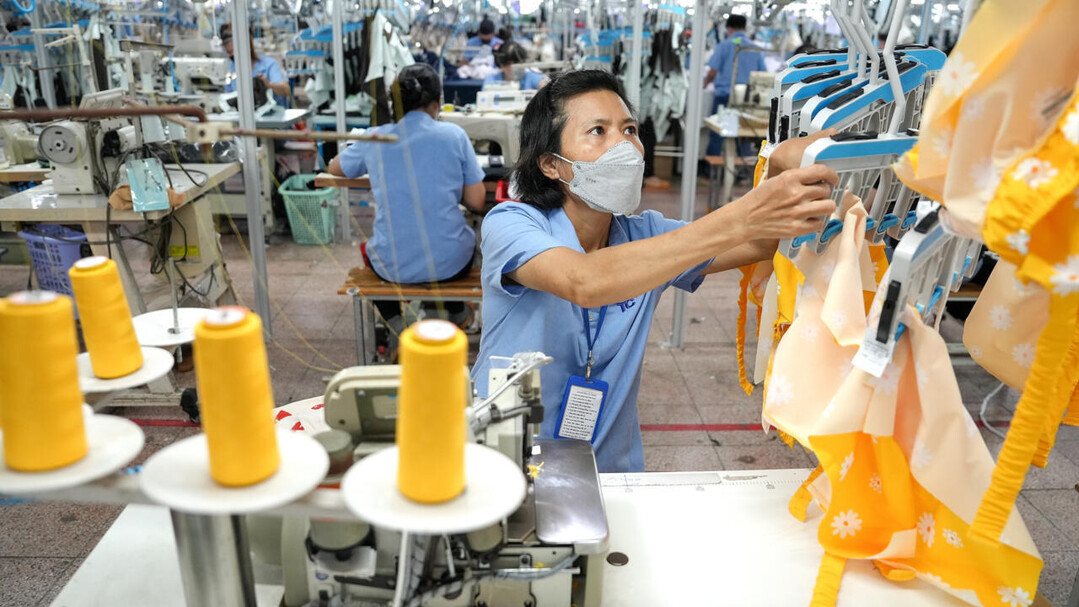
Taipei - Major Taiwanese textile and furniture companies with extensive production bases in Southeast Asia are expressing growing apprehension over the risks posed by the United States' recently announced global tariff increases.
Eclat Textile Co., a key supplier of fabrics to major global sportswear brands such as Nike, Lululemon, and Under Armour, revealed last Thursday that 60% of its garment sales originate from the U.S. market.
In an interview with the Central News Agency (CNA), Eclat Textile explained that with 60% of its total production occurring in Vietnam, 27% in Indonesia, and 10% in Cambodia, the potential impact of the U.S. tariff hikes is significant.
U.S. President Donald Trump announced sweeping "reciprocal tariffs" last Wednesday, ranging from 10% to over 40% on goods from countries worldwide, set to take effect on April 9th.
The tariff rates announced by President Trump include levies of 32% on Taiwan, 34% on China, 49% on Cambodia, 46% on Vietnam, 36% on Thailand, and 32% on Indonesia.
Despite having diversified its production locations, Eclat Textile anticipates that it will be unable to completely avoid the repercussions of the new tariffs.
In response, Eclat Textile stated its intention to enhance production efficiency through close collaboration with its partners to mitigate costs and to forge strategic partnerships with its clients to navigate the uncertainties arising from President Trump's policies.
While some Taiwanese companies are reportedly considering investments in the U.S. market to circumvent the tariffs, Eclat Textile foresees challenges in expanding production within the United States due to the textile industry's high labor costs and a scarcity of suppliers.
Meanwhile, Makalot Industrial Co., a manufacturer of trousers, underwear, and pajamas, also voiced concerns to CNA regarding the potential financial strain President Trump's tariffs could place on Southeast Asian nations.
Makalot disclosed that over 70% of its total revenue is generated from the U.S. market, with its production heavily concentrated in Indonesia (41%), Vietnam (37%), and Cambodia (14%).
Makalot is scheduled to hold an international conference next week to engage in discussions with its clients to explore strategies for sharing the anticipated financial burden resulting from President Trump's latest tariff measures.
Adding to the chorus of concern, prominent footwear manufacturer Pou Chen Corp., an original equipment manufacturer (OEM) for major global brands like Nike, Adidas, and New Balance, indicated that it will also engage in discussions with its clients to determine the most effective strategies for addressing the tariffs. Market estimates suggest that Pou Chen's production is primarily located in Indonesia (53%) and Vietnam (over 30%).
Beyond the textile sector, other Taiwanese companies, including furniture manufacturers Shane Global Holding Inc. and Nien Made Enterprise Co., are also bracing for the impact of the U.S. tariffs. Market estimates indicate that Shane Global produces 64% of its goods in China and Cambodia, while Nien Made manufactures 80% in these two countries.
Notably, several Taiwanese technology firms also reportedly maintain substantial production lines in Southeast Asian nations.
In response to these concerns, Taiwan's economic planning agency, the National Development Council (NDC), announced on Friday that it would offer assistance to Taiwanese manufacturers operating in Southeast Asia who wish to return to Taiwan.
NDC Minister Liu Jing-ching told reporters that the government would optimize Taiwan's investment environment to support Taiwanese companies in strengthening their global competitiveness.
Further Insights:
U.S. Reciprocal Tariffs: The tariffs announced by the Trump administration are interpreted as a measure to express dissatisfaction with the trade practices of specific countries and to protect domestic industries. The term "reciprocal" implies that the U.S. will impose tariffs on goods from countries at a level corresponding to the tariffs those countries levy on American products. However, this move, characterized by global tariff hikes, has sparked opposition from trade partners and raises concerns about significant disruptions to global supply chains.
Southeast Asia as a Production Hub: Many Taiwanese manufacturers have established production bases in Southeast Asian countries to capitalize on lower labor costs and geographical advantages. Vietnam, Indonesia, and Cambodia, in particular, have become major manufacturing hubs for global companies due to relatively low wages and government policies aimed at attracting investment. The U.S.'s recent tariff increases are expected to weaken the price competitiveness of companies with production facilities in these regions and reduce their access to the U.S. market.
Reshaping Global Supply Chains: The U.S. tariffs could accelerate the restructuring of global supply chains. Global manufacturers, including Taiwanese companies, may consider relocating production bases or increasing their production within the United States to avoid tariff barriers and optimize production costs. This could negatively impact the manufacturing competitiveness of Southeast Asian countries and intensify competition among nations seeking to attract new production facilities.
Taiwanese Government Support Policies: Recognizing the challenges faced by its companies, the Taiwanese government is likely to formulate various support policies to encourage domestic relocation. These may include providing investment incentives, easing regulations, and enhancing infrastructure to ensure the stability of the Taiwanese economy and maintain global competitiveness. However, it is anticipated that a large-scale shift of production bases by companies with significant overseas investments will not be a straightforward process in the short term.
Impact and Outlook: The abrupt announcement of U.S. tariff hikes has created considerable uncertainty for Taiwanese manufacturers with production bases in Southeast Asia. These companies are expected to explore various self-help measures, such as improving production efficiency and strengthening collaboration with clients, while closely monitoring the Taiwanese government's support policies and changes in the global trade environment. The ramifications of the U.S. tariff measures on the global trade order and the economies of various nations remain to be seen.
[Copyright (c) Global Economic Times. All Rights Reserved.]






























